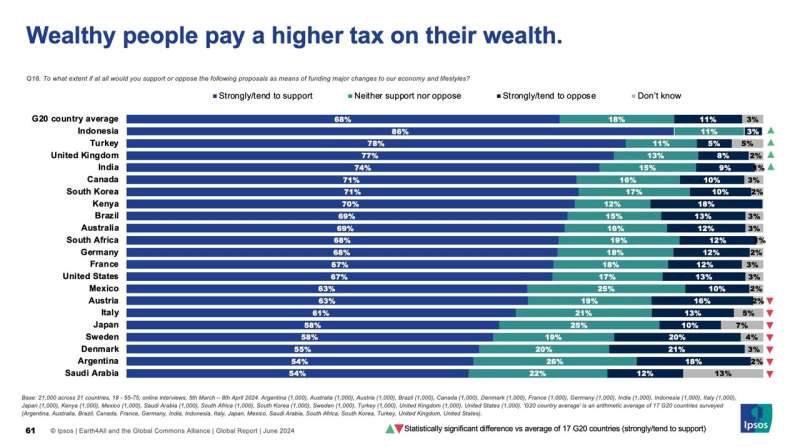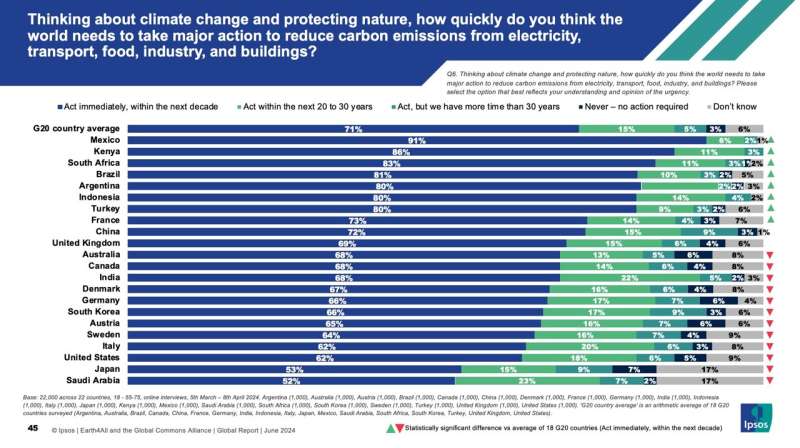This article has been reviewed according to Science X's editorial process and policies. Editors have highlighted the following attributes while ensuring the content's credibility:
fact-checked
proofread
Tax the rich, say a majority of adults across 17 G20 countries surveyed

A new survey of adult citizens in 18 of the world's largest economies has revealed majority support for tax reforms and broader political and economic reform. (Not all questions were asked in China, as indicated when findings reference 17 G20 countries.)
Around two-thirds (68%) of citizens across 17 G20 countries surveyed back a wealth tax on wealthy people as a means of funding major changes to our economy and lifestyle, with only 11% opposed, while 70% support higher rates of income tax on wealthy people, and 69% favor higher tax rates on large businesses, according to the survey conducted by Ipsos.
Support for a wealth tax on wealthy people is highest in Indonesia (86%), Turkey (78%), the UK (77%) and India (74%). Support is lowest in Saudi Arabia (54%), and Argentina (54%), but still over half the respondents surveyed. In the United States, France and Germany, around two in three of those surveyed support a wealth tax on wealthy people (67%, 67% and 68% respectively).
Results also show that when thinking about climate change and protecting nature, 71% of citizens in 18 G20 countries surveyed believe the world needs to act immediately, within a decade to reduce carbon emissions from electricity, transport, food, industry and buildings. This rises to 91% of Mexicans, 83% of South Africans and 81% of Brazilians surveyed. This belief is lowest—but still over half of respondents—in Saudi Arabia (52%), Japan (53%), the United States (62%) and Italy (62%).
The findings come as finance ministers from G20 countries, including the United States, China, and India, prepare to meet in Brazil this July. For the first time, a wealth tax is on the agenda as these nations deliberate on strategies to address economic and environmental challenges.
The survey, commissioned by Earth4All and the Global Commons Alliance, explored support for economic and political transformation in 18 of the G20 nations.
The survey highlighted broad support for using additional tax revenues to fund policy proposals to changes to our economy and lifestyles. Key areas with strong support include green energy initiatives, universal health care and strengthening workers' rights. Even less popular proposals, such as universal basic income and investment in citizens' assemblies to strengthen democracy, attract support from about half of respondents.
Owen Gaffney, co-lead of the Earth4All initiative, stated, "The message to politicians could not be clearer. The vast majority of people we surveyed in the world's largest economies believe major immediate action is needed this decade to tackle climate change and protect nature. At the same time, many feel the economy is not working for them and want political and economic reform. It's possible this may well help explain the rise in populist leaders."
"Our survey results provide a clear mandate from those across the G20 countries surveyed: redistribute wealth. Greater equality will build stronger democracies to drive a fair transformation for a more stable planet."

Jane Madgwick, Executive Director at the Global Commons Alliance, echoed this urgency, saying, "Science demands a giant leap to address the planetary crisis, climate change and to protect nature. And 71% of citizens in 18 G20 countries surveyed support immediate action within the next decade to reduce carbon emissions."
In 17 G20 countries surveyed, a majority of people believe economies should move beyond a singular focus on economic growth.
68% of those across 17 G20 countries surveyed agree that the way their country's economy works should prioritize the health and well-being of people and nature rather than focusing solely on profit and increasing wealth. Furthermore, 62% agree that a country's economic success should be measured by the health and well-being of its citizens, not how fast the economy is growing.
Trust in government is low, with only 39% of people in 17 G20 countries surveyed believing their government can be trusted to make decisions for the benefit of the majority of people, and just 37% trusting their government to make long-term decisions that will benefit the majority of people 20 or 30 years from now.
There is a notable demand for reform of national and global political and economic systems. In the 17 G20 countries surveyed, 65% of respondents believe their national political system needs major changes (36%) or to be completely reformed (29%). A similar proportion (67%) feel the same about their country's economic system (41% that it needs major changes and 27% that it needs to be completely reformed).
Sandrine Dixson-Declève, executive chair of Earth4All and co-president of the Club of Rome said, "This survey proves once again that the majority of citizens across G20 countries believe it is time for an economy that delivers greater well-being, more climate solutions and less inequality. But the results also show a lack of trust in government, especially in Europe. With the recent European elections moving towards the radical right, we need to hold governments accountable to introduce an economy that services people and planet at the same time."
The survey also asked whether people are optimistic or pessimistic about their future. On average, 62% of people in 18 G20 countries surveyed are optimistic about their own future. However, only 44% feel positive about their country's future, while 38% are optimistic about the future of the world. Participants in emerging economies like Indonesia, Mexico, Brazil, and India, along with those in China and Saudi Arabia are the most optimistic while participants in Europe and those in Japan and South Korea tend to be less optimistic.
Provided by The Club of Rome




















